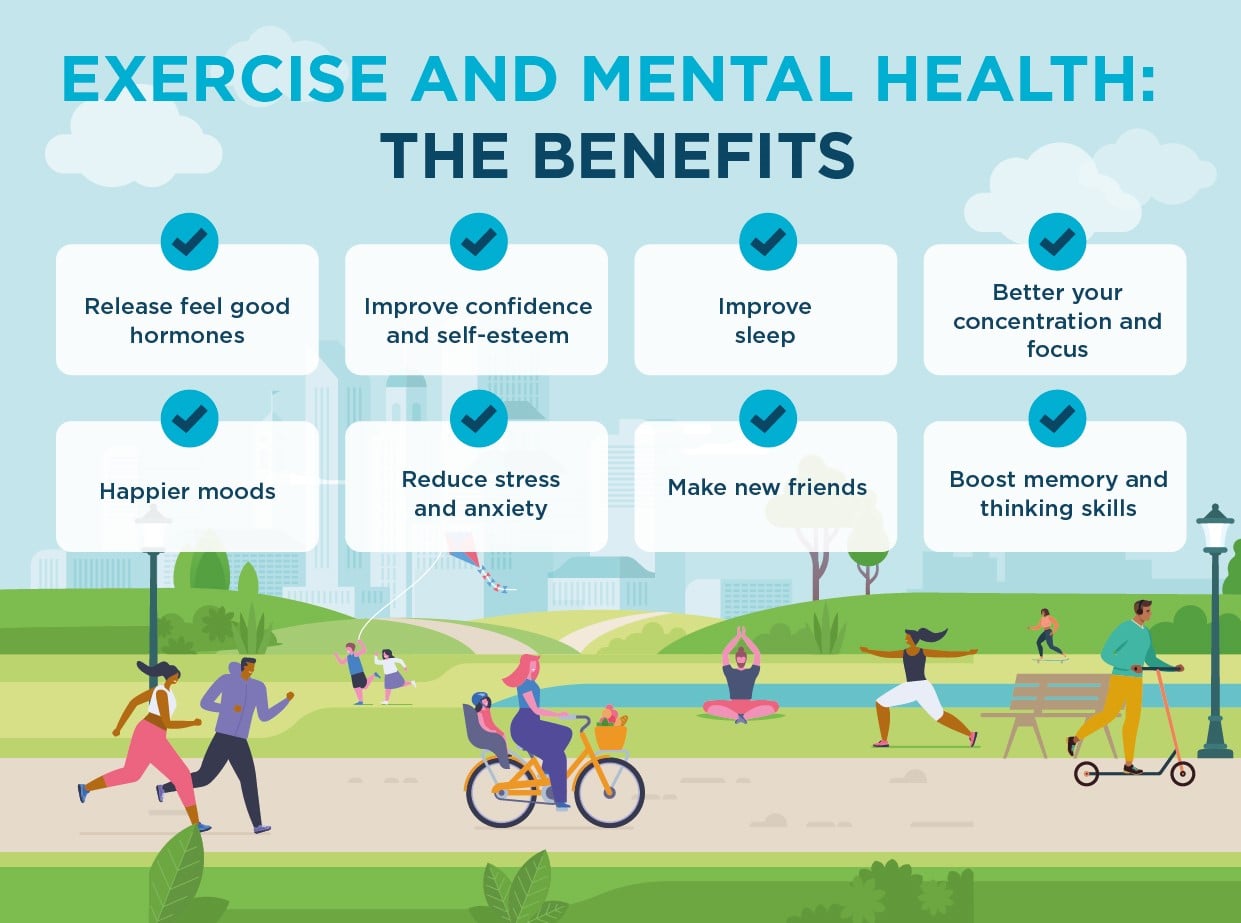Sweat Out the Blues: Exercise for a Happier Mind
Have you ever noticed that after a good workout, you not only feel physically invigorated, but also mentally refreshed? That’s because there is a strong connection between our mind and body, and regular exercise plays a key role in boosting our mental health.
When we engage in physical activity, our body releases endorphins, also known as the feel-good hormones. These endorphins act as natural painkillers and mood elevators, helping to reduce feelings of stress and anxiety. In fact, studies have shown that just 30 minutes of moderate exercise can have a positive impact on our mood, leaving us feeling happier and more relaxed.
But it’s not just about the immediate effects of exercise on our mood – regular physical activity can also have long-term benefits for our mental health. By incorporating exercise into our daily routine, we can improve our overall well-being and reduce the risk of developing conditions such as depression and anxiety.
In addition to the chemical changes that occur in our brain during exercise, there are also psychological benefits to be gained. When we set fitness goals and work towards achieving them, we experience a sense of accomplishment and self-confidence. This boost in self-esteem can have a profound impact on our mental health, helping us to overcome challenges and stay resilient in the face of adversity.

Image Source: priorygroup.com
Furthermore, exercise provides an opportunity to clear our minds and focus on the present moment. Whether we’re going for a run, practicing yoga, or lifting weights, physical activity allows us to escape from the stresses of daily life and find a sense of peace and clarity. This mental break can be incredibly rejuvenating, helping us to recharge and face the rest of our day with a positive outlook.
So, the next time you’re feeling down or stressed out, consider lacing up your sneakers and breaking a sweat. Not only will you be doing your body a favor, but you’ll also be giving your mind a much-needed boost. Exercise is a powerful tool for improving mental health, so make it a priority in your daily routine and watch as your mood and overall well-being soar to new heights.
Remember, a happier mind starts with a healthy body – so get moving and sweat out the blues!
Mind and Body Harmony: How Fitness Fuels Happiness
Exercise is not just about physical health and weight management; it also plays a crucial role in boosting mental health and overall happiness. The mind-body connection is a powerful phenomenon that demonstrates how our physical well-being can greatly impact our mental well-being. In this article, we will explore how regular exercise contributes to a harmonious relationship between the mind and body, ultimately leading to increased happiness.
When we engage in physical activity, our bodies release endorphins, also known as feel-good hormones. These endorphins interact with receptors in the brain to reduce our perception of pain and trigger a positive feeling in the body. This natural high that comes from exercise can help alleviate symptoms of stress, anxiety, and depression. By incorporating regular exercise into our routine, we can effectively combat negative emotions and improve our overall mood.
In addition to the chemical benefits of exercise, physical activity also provides a sense of accomplishment and empowerment. Setting fitness goals and working towards achieving them can boost self-confidence and self-esteem. The satisfaction of reaching milestones in our exercise routine can translate into a more positive outlook on life and a greater sense of happiness.
Furthermore, exercise has been shown to improve cognitive function and enhance brain health. Physical activity increases blood flow to the brain, which can lead to improved memory, focus, and overall cognitive performance. By keeping our brains active and healthy through regular exercise, we can ward off cognitive decline and maintain mental sharpness as we age.
It is important to note that the mind-body connection works both ways. Just as exercise can positively impact mental health, our mental state can also influence our physical well-being. Stress, anxiety, and other negative emotions can manifest in physical symptoms such as muscle tension, headaches, and fatigue. By addressing our mental health through exercise and other self-care practices, we can prevent these physical manifestations and promote overall wellness.
Incorporating a variety of exercise modalities into our routine can help us maintain a balanced mind-body connection. Cardiovascular exercises like running, cycling, or dancing can get our hearts pumping and our endorphins flowing. Strength training exercises like weightlifting or bodyweight exercises can build muscle and improve our physical strength, leading to a greater sense of empowerment. Mind-body practices like yoga or Pilates can help us connect with our breath, reduce stress, and improve our flexibility and balance.
Finding an exercise routine that we enjoy is key to maintaining consistency and reaping the mental health benefits of physical activity. Whether it’s dancing to our favorite music, going for a nature walk, or practicing mindfulness through yoga, the important thing is to move our bodies in a way that feels good and brings us joy. By prioritizing our mental and physical well-being through regular exercise, we can cultivate a harmonious relationship between the mind and body, leading to increased happiness and overall wellness.
The Importance of Regular Exercise for Mental Health